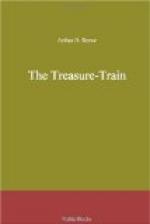“It is a simple test,” explained Kennedy, indicating to Miss Langdale that he wished to repeat it on her patient.
Mrs. Wardlaw’s knee showed no reflex! As he turned to us, we could see that Kennedy’s face was lined deeply with thought, and he paced up and down the room once or twice, considering what he had observed.
I could see that even this simple interview had greatly fatigued Mrs. Wardlaw. Miss Langdale said nothing, but it was plainly evident that she objected strongly to the strain on her patient’s strength.
“That will be sufficient,” nodded Craig, noticing the nurse. “Thank you very much. I think you had better let Mrs. Wardlaw rest in her own room.”
On the nurse’s arm Mrs. Wardlaw withdrew and I looked inquiringly from Kennedy to Doctor Leslie. What was it that had made this beautiful woman such a wreck? It seemed almost as though the hand of fate had stretched out against one who had all to make her happy—wealth, youth, a beautiful home—for the sullen purpose of taking away what had been bestowed so bounteously.
“It is polyneuritis, all right, Leslie,” Craig agreed, the moment we were alone.
“I think so,” coincided Leslie, with a nod. “It’s the cause I can’t get at. Is it polyneuritis of beriberi—or something else?” Kennedy did not reply immediately.
“Then there are other causes?” I inquired of Leslie.
“Alcohol,” he returned, briefly. “I don’t think that figures in this instance. At least I’ve seen no evidence.”
“Perhaps some drug?” I hazarded at a venture.
Leslie shrugged.
“How about the food?” inquired Craig. “Have you made any attempt to examine it?”
“I have,” replied the commissioner. “When I came up here first I thought of that. I took samples of all the food that I could find in the ice-box, the kitchen, and the butler’s pantry. I have the whole thing, labeled, and I have already started to test them out. I’ll show you what I have done when we go down to the department laboratory.”
Kennedy had been examining the books in the bookcase and now pulled out a medical dictionary. It opened readily to the heading, “Polyneuritis—multiple neuritis.”
I bent over and read with him. In the disease, it seemed, the nerve fibers themselves in the small nerves broke down and the affection was motor, sensory, vasomotor, or endemic. All the symptoms described seemed to fit what I had observed in Mrs. Wardlaw.
“Invariably,” the article went on, “it is the result of some toxic substance circulating in the blood. There is a polyneuritis psychosis, known as Korsakoff’s syndrome, characterized by disturbances of the memory of recent events and false reminiscences, the patient being restless and disorientated.”
I ran my finger down the page until I came to the causes. There were alcohol, lead, arsenic, bisulphide of carbon, diseases such as diabetes, diphtheria, typhoid, and finally, much to my excitement, was enumerated beriberi, with the added information, “or, as the Japanese call it, kakke.”




